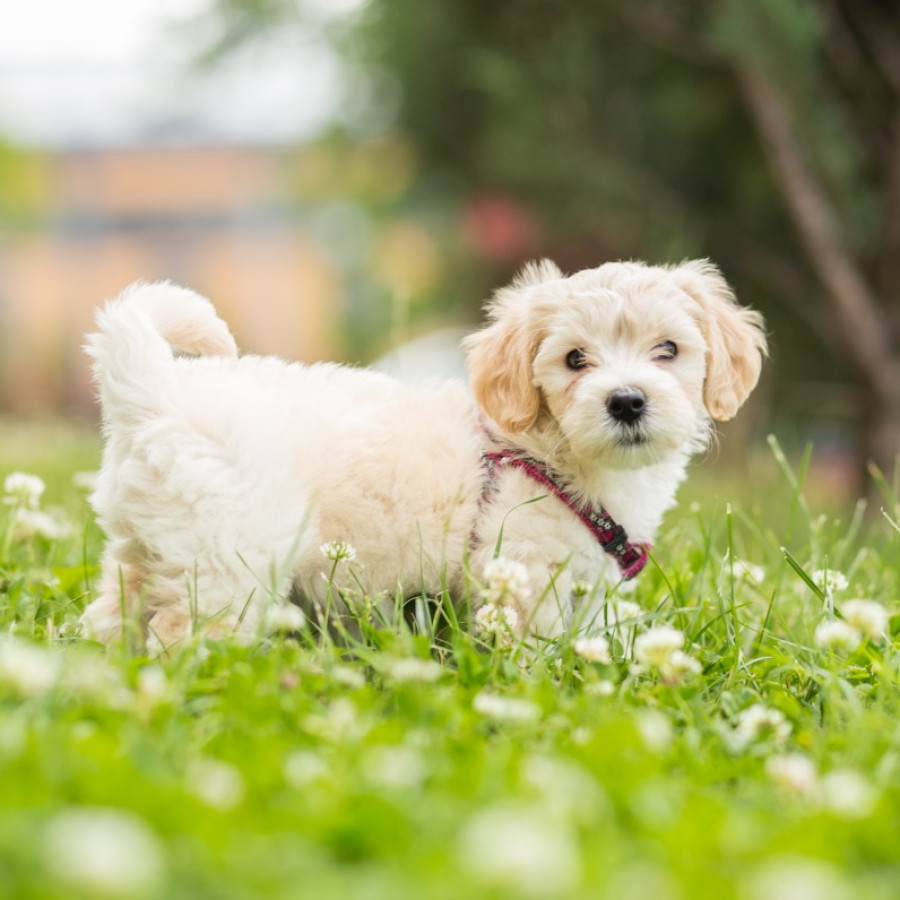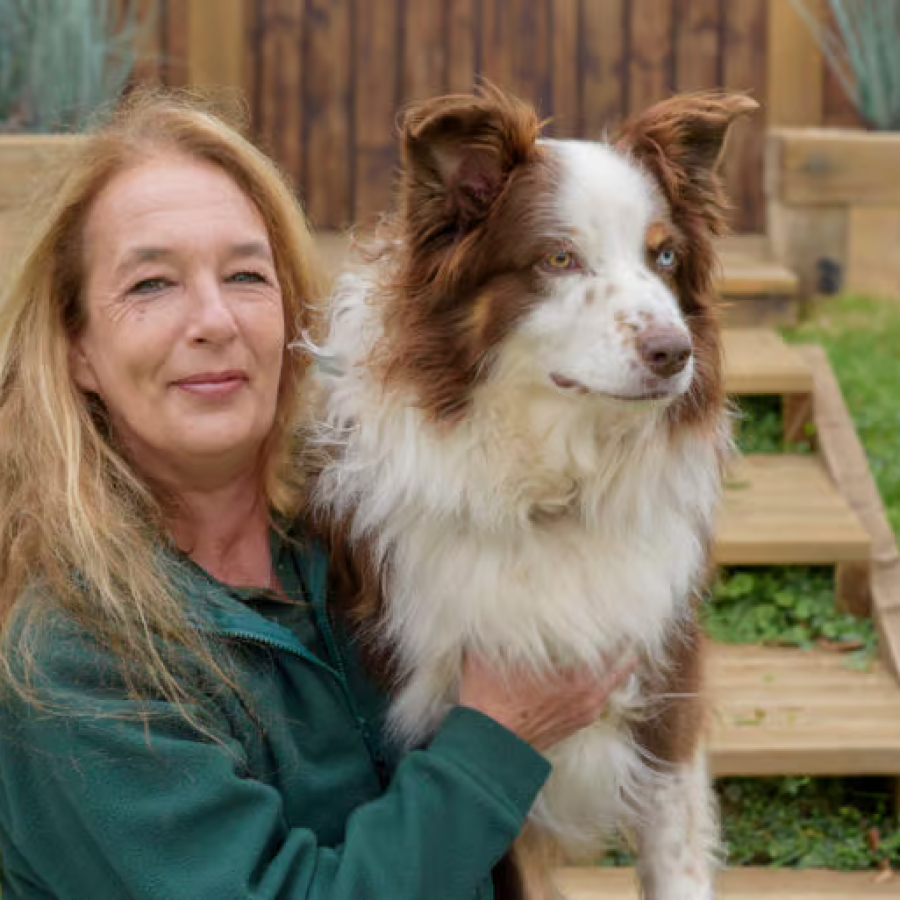
Cavachon Dog Breed
The affectionate Cavachon is ideal for adoring owners. Perfect for families or retirees, so long as they’re invited to sofa snuggles.

The affectionate Cavachon is ideal for adoring owners. Perfect for families or retirees, so long as they’re invited to sofa snuggles.
The Cavachon is a small, popular crossbreed. A cross between a Cavalier King Charles Spaniel and a Bichon Frise, they can be “crossed back” with one of the original parent breeds. They come in a variety of colours and their coats can range from soft and wavy to tight curls.
Bred for companionship the Cavachon is a happy-go-lucky ball of fluff. They are incredibly bright and fun loving. They love nothing more than a snuggle with their favourite person, so they’re not an ideal choice if you need a dog that can cope with being home alone for extended periods.
They need and enjoy regular exercise, but you won’t need to walk for hours to keep them happy.
Cavachons adore your attention and may bark at you to remind you they’re there if they start to feel forgotten about.
Disclaimer
While these breed traits give a general idea of what to expect from a specific type of dog, it's important to remember that every dog is unique. Just like people, each dog comes with their own distinct personality, quirks, and characteristics!

Both the Cavalier King Charles Spaniel and Bichon Frise can make fabulous family pets, and Cavachons are just the same! However, it is essential that you meet the puppy’s parents to ensure their personality will be the right fit for your family.
Being bright and playful means they make great friends for children. Although they may need protecting from overly excitable children who are drawn to their teddy bear looks. Like all dogs, they need their own space at times, free from disturbance or distraction.
The companionable Cavachon would also be ideal for someone who predominately works from home or a retired couple/person. As long as they’re doted on, they really are a versatile little dog!
Yes! The Cavachon is essentially a companion dog, meaning that they were bred to be very affectionate and not leave their owner’s side.
If you’re looking for a lap or bed warmer this could well be the dog for you. If you like your own space (and sole use of your furniture) you would probably be better with a more independent dog. Cavachons also require regular coat maintenance, so it’s a good thing this four-legged friend enjoys regular handling.
The Cavachon is incredibly bright and full of fun. When not snuggling with you they need plenty of opportunities to play and use their brains. They love to chase their toys, and with a little bit of training they will bring them back for you to throw again.
Like all dogs, Cavachons love to use their nose to seek out food. Hiding treats around the house and/or garden for them to find is a great game to get the kids involved in and perfect for entertaining your curious Cavachon.
Cavachon's are not a particularly quiet breed, but they are not nuisance barkers. They can make good little watchdogs, even if their size and adorable looks won’t act as much of a deterrent. If not socialised correctly they may bark nervously at strangers, but they often warm up to others quickly. Being companion dogs, the Cavachon will let you know if they’re feeling ignored or bored. They’ll also let the neighbours know if they’ve been left home alone for too long.
Cavachons are extremely adorable puppies. It’s essential that their socialisation is done very carefully, as they often attract a lot of adoring strangers. Some puppies can find this attention overwhelming, resulting in the development of fear aggression towards some people. Your puppy needs slow and steady exposure to calm strangers to avoid this from happening.
As a companion dog Cavachons don’t always cope well being left home alone. This can result in separation related issues such as destruction and barking.
Some Cavachons like the sound of their own voice, and if they feel that they aren’t getting enough attention they will bark to let you know. This can become a problem if their needs are not met.
All of these issues can be avoided or reduced with appropriate socialisation and habituation training combined with basic obedience training.
Cavachons aren’t worried about the size of home they live in. Providing they have regular access to green spaces for toilet breaks and exercise, they can thrive in any type of home setting.
They certainly need companionship, therefore a home where they will be allowed to snuggle on the sofa and/or curl up on your bed is essential. They are unlikely to thrive in a home where they will need to be left home alone for full working days. If you work from home, have a young family, or are retired then this little dog could be a great match for you.
With good socialisation and careful introductions Cavachons can live happily alongside other dogs and household pets.
Anyone living with a Cavachon must have enough time to properly meet their needs, this includes daily grooming.
Whilst not necessarily suited to long hikes, the Cavachon still requires regular daily exercise. They enjoy the opportunity to run free and stretch their legs by chasing sniffs and/or toys.
Being a small and sociable dog, they also enjoy outings to dog friendly places such as garden centres and coffee shops.
It’s just as important to exercise a dog's mind as it is their body. Cavachons are no different. They are bright and eager to learn new things, especially when they’re young. Delivering their food via enrichment and/or activity feeders is a great way to keep them mentally stimulated.
Cavachon puppies are like little sponges, and they love to learn.
Make the most of your young Cavachons eagerness to learn, their enthusiasm tends to wane once they reach middle age.
Socialisation must be done slowly and carefully so that they don’t get overwhelmed. Acclimatising them to things that they will be around in the future like cars, bikes, and loud noises is also essential.
Dogs respond best to reward based training, Cavachons are very food motivated so use this to your advantage!
Adolescence can be a challenging time for all dogs, but hang in there, your perseverance will be rewarded once they reach maturity.
If you meet your Cavachons needs and train them appropriately you will avoid disruptive issues, including:
• separation related problems
• fear aggression
• nuisance barking
There’s no guarantee what a crossbreed’s coat will be like. A Cavachon’s coat can range from soft, straight, and silky to bouncy loose curls. Whilst they are low shedders, they still require daily grooming to keep them knot free. Daily grooming sessions also give you the opportunity to check your dog over for any lumps, scratches, parasites or twigs and seeds that can get caught in their coat.
It is also advisable to wipe the area under their eyes to avoid any staining.
Your Cavachon would also benefit from trips to a professional groomer every six weeks, where their coat can be brushed, washed, trimmed, and styled. They will also get their ears cleaned and nails clipped if required. Remember, this will come at a financial cost, so be sure to build it into your budget.
Being a direct cross between two purebred breeds means consideration must be given to the genetic health issues that both parent breeds can carry.
For the Cavachon these include:
• Mitral Valve Disease (heart problem)
• Luxating Patella (slipping kneecaps)
• Progressive Retinal Atrophy (eye problem)
• Hip Dysplasia (poorly formed hip socket)
• Cushing Disease (cortisol level problem)
• Syringomyelia (cyst on the spinal cord)
It is vital that you select a puppy from a breeder that carries out health testing on their breeding stock for all of these conditions.
I don’t need lots of exercise, but daily outings are essential. I’d love going to the garden centre or local cafe if you don’t want to walk in the rain.
I may be bred for companionship but I still like using my brain. I love learning new things and accessing my food through enrichment feeders like kongs and snuffle mats.
Once you’ve taught me the basics so I can enjoy off lead walks, I’d also like to have a go at trick or agility training.
You can expect to pay up to £2000 for a responsibly bred Cavachon puppy.
It can cost several hundred pounds in set up costs for any puppy. This includes, food, bowls, toys, bed, puppy pen, collar, lead, harness etc.
The ongoing costs include, food, vaccinations, parasite control, insurance premiums and grooming costs.
Take our quiz to discover which breed is right for you
Take our quizPlease call our pet support line on 0300 303 9333 (7 days a week – 8.30am - 4pm)